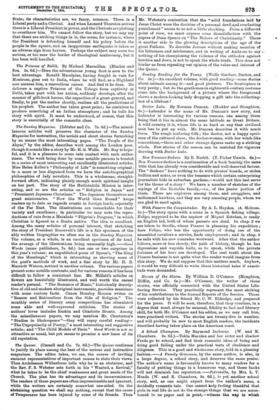The Sunday Magazine. (Isbister and Co. 7s. 6d.)—The miscel- laneous
articles well preserve the character of the Sunday Magazine for instruction, the serials and short stories furnishing by no means the most interesting pages. "The People of the Abyss," by the editor, describes work among the London poor, though it sounds like a story by Mr. H. G. Wells. Mr. Ray is hope- ful, and it is a pleasure to come into contact with such enthu- siasm. The work being done by some notable parsons is treated in a series of most interesting and excellently illustrated articles. Miss Helen Keller's "Philosophy of Life" is something original ; in a more or less disguised form we have the autobiographical philosophies of lady novelists. This is a wholesome, straight forward effort, indicating plainly enough much spiritual insight on her part. The story of the Metlakahtla Mission is inter- esting, and so are the articles on " Religion in Japan" and "Prominent Japanese Christians." The Japanese themselves are great missionaries. "How the World Goes Round" keeps readers up to date as regards events in foreign lands, especially of the Far East. The illustrations are remarkable for their variety and excellence ; in particular we may note the repro- ductions of cuts from a Matabele "Pilgrim's Progress," in which Christian is figured as a Bantu native. The idea is excellent. Among the many articles of personal interest, that sketching the story of President Roosevelt's life is a fair specimen of the ably written biographies we often see in the Sunday Magazine. The volume, as a whole, is an excellent specimen of its kind, the average of the illustrations being unusually high.—Good Words (same publishers, 7s. 6d.) has one or two surprises in this year's volume: an unpublished poem of Byron's, "The King of the Humbugs," which is interesting as showing some of the poet's methods of work, and a fine story by Mr. H. B. Marriott Watson, noticed in another column. The various papers present some notable contrasts, and for various reasons it has been difficult to follow a consistent line. Mr. Millatt's articles on flowers are beautifully illustrated, and well worth the casual reader's perusal. "The Romance of Music," historically descrip- tive of old and modern aboriginal instruments, provides musicians with some curious facts. Canon Hensley Henson writes on "Reason and Rationalism from the Side of Religion." The monthly series of literary essay competitions has stimulated some able and well-expressed criticism. The stories of authors' loves includes Ruskin and Charlotte Brontii. Among the miscellaneous papers, we may mention Mr. Chesterton's "Studies in Shakespeare "—they will repay careful reading— "The Unpopularity of Poetry," a most interesting and suggestive article; and "The Child Models of Paris." Good Words is not so attractive as usual, but yet seems to promise a new lease of its old reputation.






































































 Previous page
Previous page